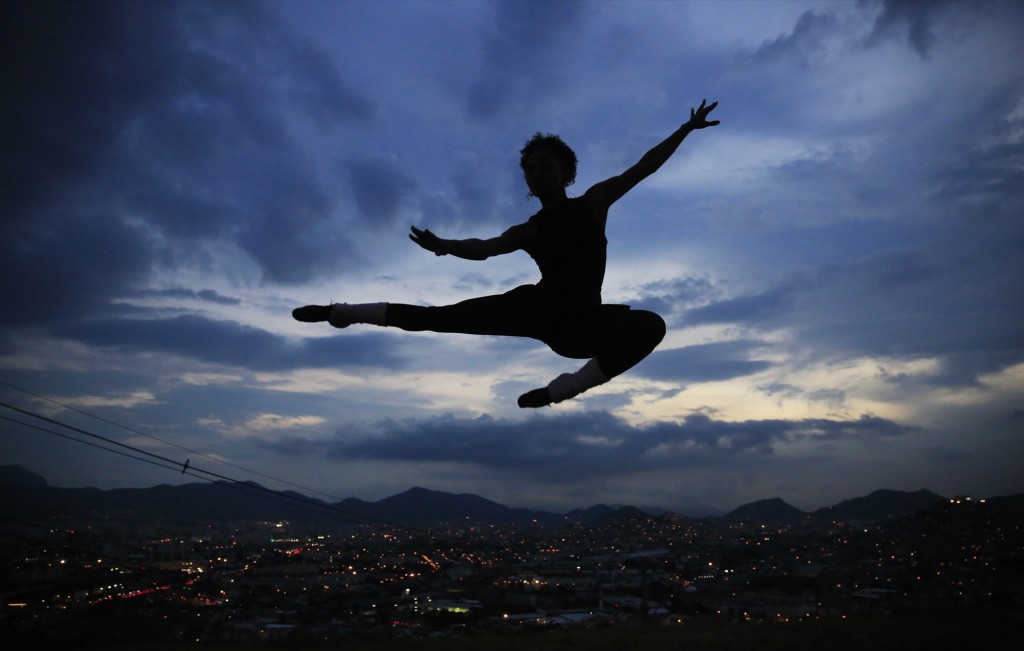 One warm afternoon in Rio de Janeiro, a dozen girls pirouette in lilac leotards, their hair tied in tight buns, rehearsing a ballet sequence to a Disney theme song. An attentive teacher puts them through their paces, pausing the music to straighten arms, correct posture and make sure nobody drifts out of step.
One warm afternoon in Rio de Janeiro, a dozen girls pirouette in lilac leotards, their hair tied in tight buns, rehearsing a ballet sequence to a Disney theme song. An attentive teacher puts them through their paces, pausing the music to straighten arms, correct posture and make sure nobody drifts out of step.
But this is not a dance school in an affluent neighbourhood – it’s a basketball court inside one of the city’s most notorious slums.
“For the girls here, ballet is a life experience,” said 20-year-old instructor Tuany Nascimento, who started the “Na Ponta dos Pés” project in 2012. A gifted ballerina and rhythmic gymnast who represented Brazil at international events, she abandoned her ambition of going professional due to “expenses we couldn’t cover” – but she is determined to give similar opportunities to children in her community.
“Every plié and jump they make is a step closer to entering college, or getting their dream job,” Nascimento continued.
She lives in Morro do Adeus, one of more than a dozen favelas that form the Alemão complex – a huge network of neighborhoods clustered on rolling hills in northern Rio with a population thought to be anywhere between 60,000 and 120,000.
Nascimento grew up in a parallel state-within-a-state: like many other favelas around the city, Alemão was effectively ruled by narco traffickers in the absence of government authority. Basic food supplies, medical services and even burials were paid for by gang leaders who maintained a precarious peace.
In November 2010, armoured vehicles rumbled along the streets and heavily armed police units re-established control over the slum. A year later, a special Police Pacification Unit (UPP) took over – part of a controversial state initiative to reduce cartel power and violence in the favelas.
“The word ‘pacification’ comes from ‘peace,’ but the majority of ‘pacified’ areas still have war,” lamented Nascimento, who would like to see authorities providing more social and cultural activities.
And the arrival of state forces has not brought peace to Alemão. On more than one occasion, Nascimento’s students have have been forced to scurry for cover when violence breaks out.
“Some of the girls have parents or brothers involved in trafficking,” continued Nascimento, who lives with her mother, stepfather and five younger siblings in a two-bedroom apartment at the top of Adeus hill.
“People get into crime because they don’t have opportunities, but the ballet project gives them a chance not to fall into the wrong kind of life.”
Fortunately, Tuany’s days of teaching workshops in the exposed outdoor sports area will soon be a thing of the past.
In September she received a grant of 15,000 reais (about $4,000) to start building a new community centre that will include workshop space, a library and a fully equipped dance studio. Local businesses have promised to pitch in with construction materials and an NGO will conduct further fundraising.
“Ballet is one of the most beautiful and transformative art forms. You need to be disciplined and respect the rules,” Nascimento said. “It gives the girls determination and focus in everything they desire and dream.”
Published @ The Guardian, 27/11/15 – click here for original.






